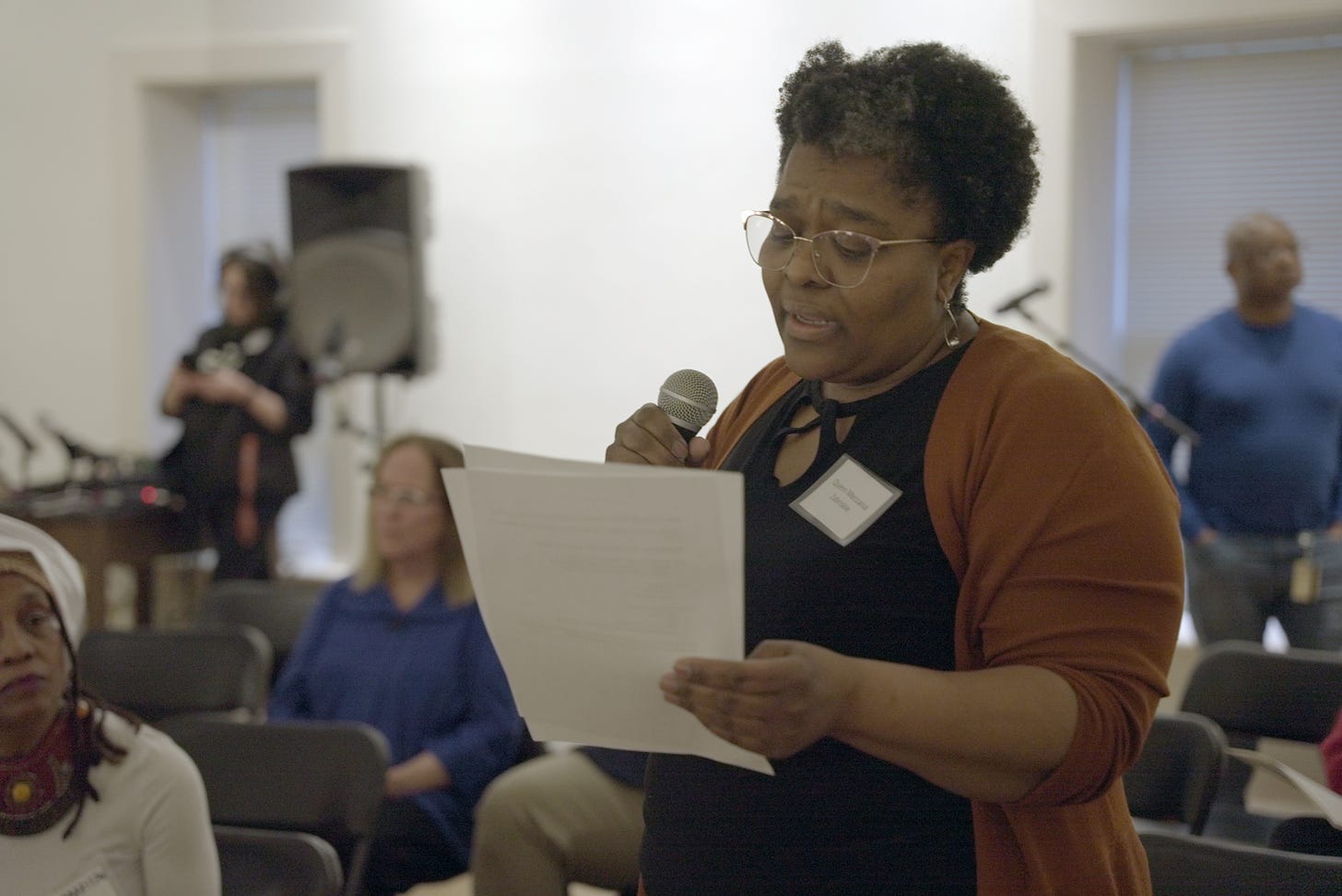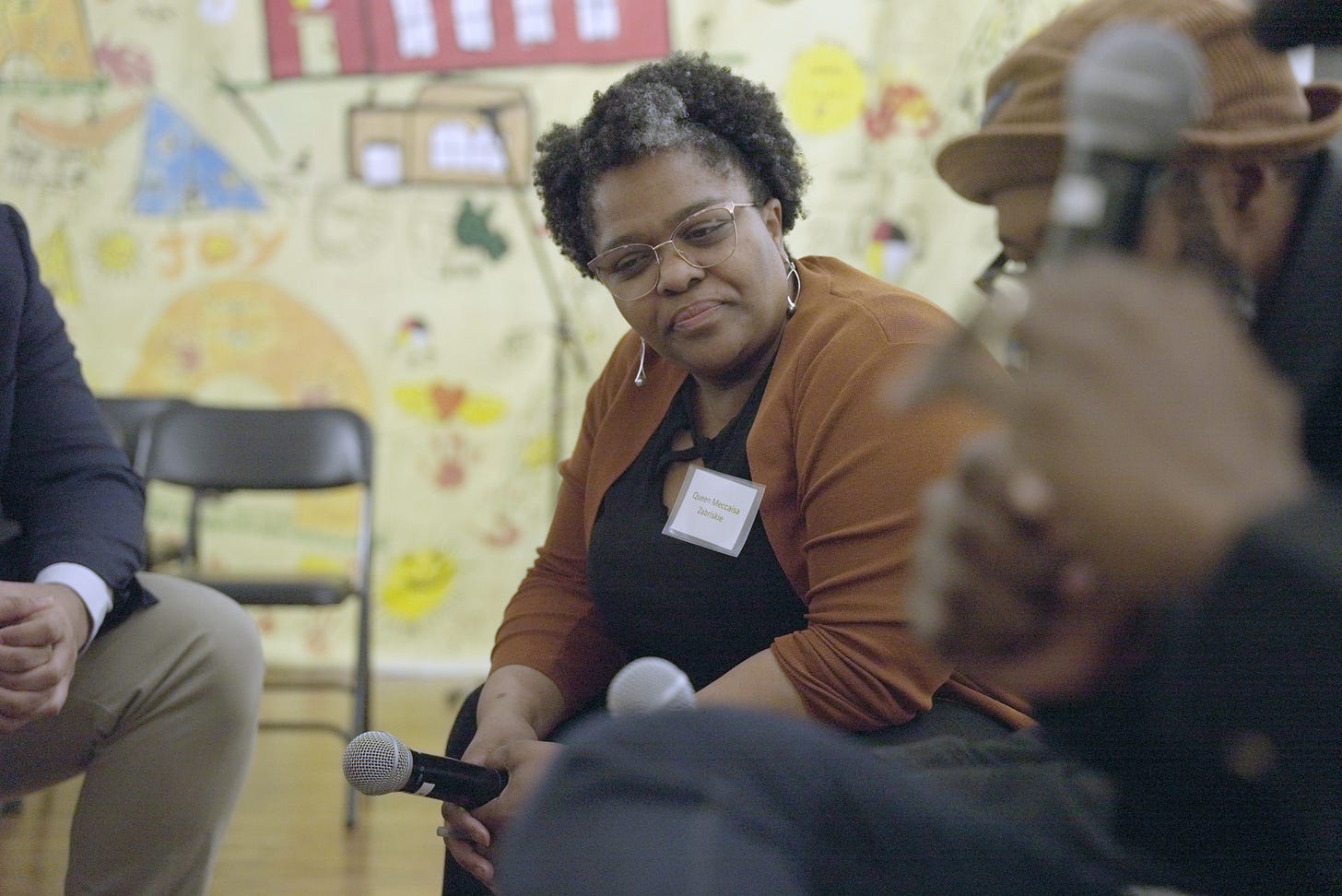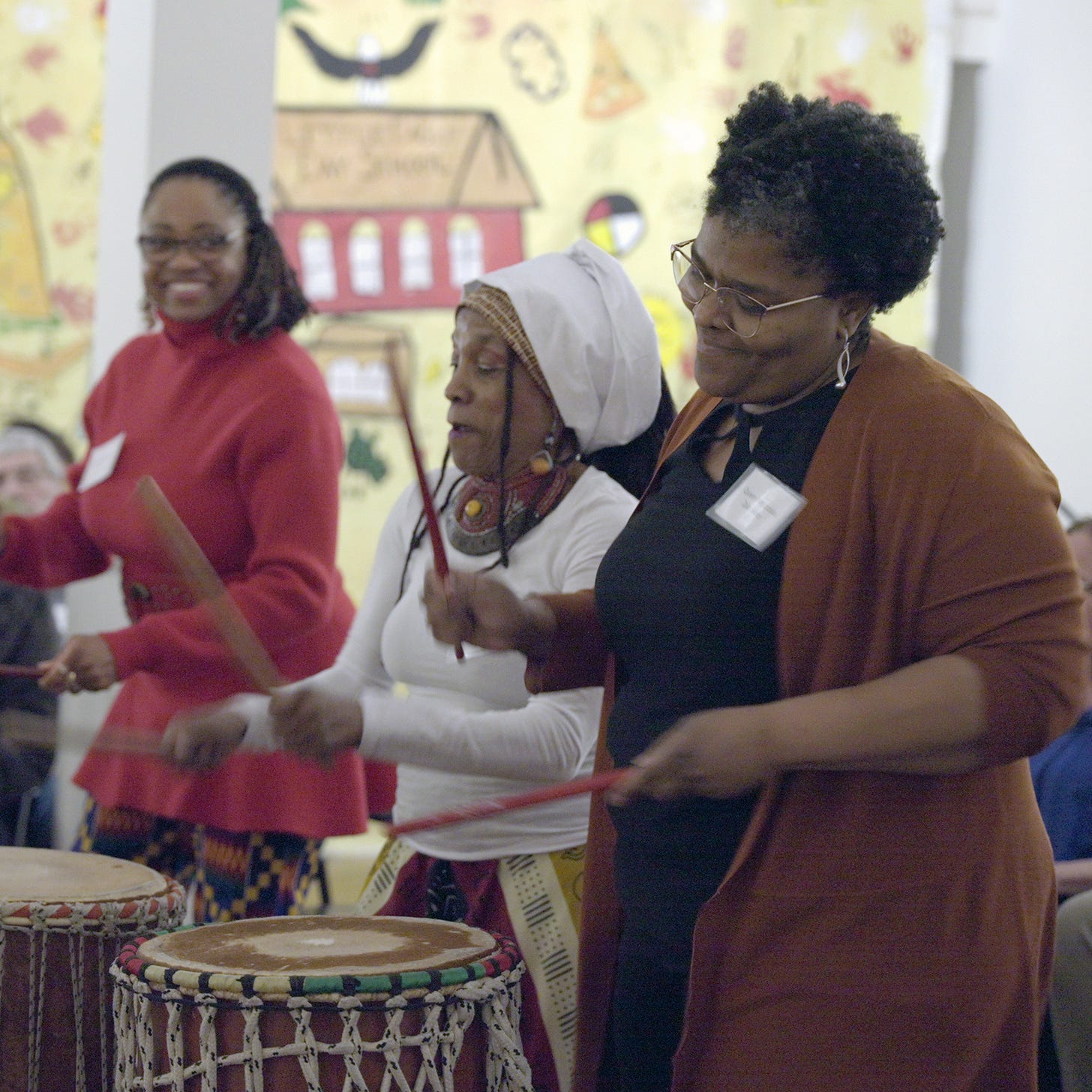This Too Shall Pass
The CSK Center’s director looks to past struggles—her own and others’—for lessons on overcoming today’s threats to justice.
The second Trump administration hangs like a threatening cloud over higher education, but Queen Meccasia Zabriskie sees a silver lining: a chance to expand her network of like-minded academics, artists, performers, and community organizers agitating against systemic racism, celebrating diverse cultures, and drawing inspiration from Black history.
Zabriskie, director of the Coretta Scott King Center (CSKC) and associate professor of Sociology and Performance Studies at Antioch, says the current racially charged pressures on colleges offer “particular opportunities for us to come together, to connect with each other, to use our creativity, help us think about how we can transform things, starting with ourselves and our families and our communities, and also transform the larger society from that.”
The White House drive to dismantle Diversity, Equity, and Inclusion (DEI) programs in government and public institutions reprise a tense period for Zabriskie at New College in Florida, a state school with a progressive reputation. As interim dean for DEI at New College of Florida, she was tasked with gathering evidence of the school’s gains in enrolling minorities—a trend Florida encouraged following the 2020 murder of George Floyd. She also taught courses in intersectionality and critical race theory—both flashpoint topics on the political right. After winning reelection in November 2022, Republican Gov. Ron DeSantis declared that “Florida is where woke goes to die,” and made the Sarasota school a prime target for disruption. Within a few months, he had named enough like-minded conservatives to New College’s Board of Trustees to oust the president and abolish DEI.
Welcomed by Antioch in September 2023, initially as a visiting associate professor, Zabriskie brought a vividly multicultural personal story, scholarship on dance, theater, and culture from West Africa to the Caribbean and Chicago, and experience as a community organizer and anti-racist activist. Raised in a Muslim African American household in the Bronx, she attended majority white institutions beginning with high school in Wellesley, Massachusetts, moving on to Duke and then Northwestern, where she earned a Ph.D.
Zabriskie’s outgoing personality lends itself to organizing. While at Duke, she started a Black History Month committee for students to gather for conversations about race, class and gender. She later expanded Black History Month activities at New College, according to the Catalyst, a student publication. In Sarasota, she helped form an Anti-Racism Working Group at the Peace Education and Action Center, and joined in organizing a Visions of the Black Experience festival comprising feature films, documentaries, panel discussions, and workshops. In May, 2023, she was also among the organizers of a Sarasota banned book fair in response to a wave of censorship in the state.
Her hope to develop mutual-support networks for academics under threat seem to gain traction at the CSKC’s Global Racial and Social Justice Summit. “I didn't want it to just be a summit where people came to hear presentations or panels and then left,” Zabriskie says. The February 13-16 event brought to Antioch some of the performers and activists Zabriskie has worked with over the years, including Ojeya Cruz Banks, a dancer-choreographer at Denison University who performed Feb. 14. Also present was Kimberly Richards, executive director of the New Orleans-based People's Institute for Survival and Beyond. Zabriskie first connected with the Institute as a graduate student at Northwestern. She attended a New Orleans meeting of an affiliated dance group, Urban Bush Women, on the effect of racism on the body. The session allowed her to talk about the negative impact of being a Black student at a predominantly white institution. She gained both an understanding of what she was experiencing and “a sense of my own power and what I could do to navigate it differently.”
The summit drew others into Zabriskie’s circle. The center received 35 responses to its call for proposals, and “we essentially said ‘yes’ to everything because the purpose of the event was to gather people in particular in this moment when we know that so many of us who do this work are under attack.” Enough outside support came from a Mellon Foundation grant to the Great Lakes Colleges Association and from the Endeavor Foundation to assist some attendees with expenses and to provide three meals a day for every registrant.
After the Antioch conference, Zabriskie participated in a webinar series she helped organize, “Dance in Defense of Academic Freedom,” put on by the Dance Studies Association. One of the installments included Amy Reid, a former colleague of Zabriskie’s at New College who is now Senior Manager of PEN America's Freedom to Learn program. The intent of the series is to present allies who “help people to continue to do their work in a climate when, as artists, as community organizers, as activists, . . . the work is under attack,” Zabriskie says.
Coming up, the CSKC plans two events to honor the Rev. Martin Luther King Jr. and Coretta Scott King and Antioch’s ties to the civil rights movement. On March 27, birthday of Coretta King ’51, the center will put on a “performance collage” created by Zabriskie and Forest Bright, associate professor of visual arts, that draws on her 1982 commencement speech at Antioch and one given at the college in 1947 by Bayard Rustin entitled “How to Conquer Jim Crow.” A champion of civil rights, labor rights, and, later in life, gay rights, Rustin was the behind-the-scenes impresario of the 1963 March on Washington. The 60th anniversary of the Rev. Martin Luther King Jr.’s commencement speech at Antioch will be commemorated in conjunction with Yellow Springs’ annual celebration of Juneteenth (June 19). The day’s events will include a partial reenactment of the speech in Red Square and the dedication of a plaque containing a quote from the speech.
The Zabriskie-Bright work, “Love is the Key,” uses messages from the Coretta King and Rustin texts that will “help us navigate what we're navigating today and in this moment,” Zabriskie says—the importance of building coalitions, “working towards and for justice and peace and advocating for . . . progressive political leadership, but also working in and with community to build networks of support and capacity and engage in collective action and nonviolent resistance.” It will place at the center “a love for and a deep caring for other human beings as we work to make a more just and inclusive society.”
It may sound wistfully nostalgic, but Zabriskie calls it “highlighting the lessons for today.”





